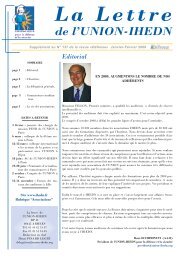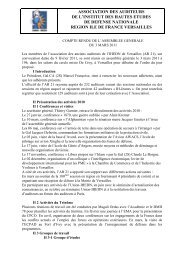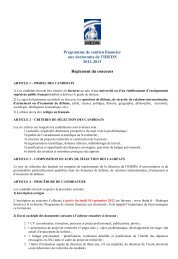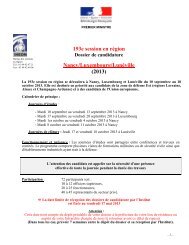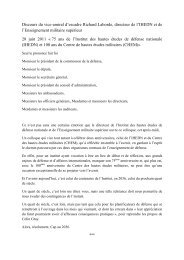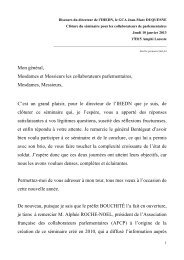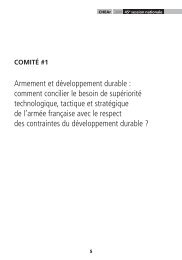Liste des auditeurs de la 64 e session - IHEDN
Liste des auditeurs de la 64 e session - IHEDN
Liste des auditeurs de la 64 e session - IHEDN
- No tags were found...
Create successful ePaper yourself
Turn your PDF publications into a flip-book with our unique Google optimized e-Paper software.
2country context. In addition, the vio<strong>la</strong>tion of human rights may have direct negative economicconsequences, which may have an ongoing negative social impact within the broa<strong>de</strong>rcommunity, which in turn affects power re<strong>la</strong>tions – and so the cycle continues.The role of National Human Rights Institutions in a hybrid systemPurely promoting an adversarial legal accountability process does not take into account thecomplexity of the re<strong>la</strong>tionship between the protection, promotion and respect of human rightsand the role, or in<strong>de</strong>ed the rights and obligations, of business. Promoting compliance mayencourage a minimalist approach from business: do what is necessary to avoid lega<strong>la</strong>ccountability. From a <strong>de</strong>veloping country perspective, compliance in itself rarely addressesthe existing challenges of poverty and inequality. The Commission has evi<strong>de</strong>nced this in itscontinuous engagement with communities, where the involvement of business may add a<strong>la</strong>yer of complexity with the one hand while eliminating a <strong>la</strong>yer of challenges with the otherhand through the positive contributions that business may make to that community.This is where the role and experiences of National Human Rights Institutions may beinvaluable: how do we communicate and create a bridge between the lived experiences ofindividuals and communities and the vocabu<strong>la</strong>ry of rights talk and accountability which may beinterpreted as necessitating minimalistic compliance by business?Examples from the CommissionThe Commission has sought to intervene and appear before other forums, such as tribunals,in or<strong>de</strong>r to promote the connections between business’ human rights obligations and whatbusiness may view as traditional commercial obligations in terms of, for example, competition<strong>la</strong>w. The Commission has twice appeared before the Competition Tribunal of South Africa, inmatters concerning bread (affecting the right of access to food) and pharmaceutics (affectingthe right of access to health care services). The objective has been to paint the human rightscontext of corporations’ actions, emphasise the horizontal application of the Bill of Rights andthe fact that non-compliance by business with their human rights obligations may give rise tofurther Constitutional consequences.Advice to businessThe Commission’s advice to business concerning legal accountability is the following: wherebusiness engages with individuals and communities, especially in a <strong>de</strong>velopmental contextconcerning comp<strong>la</strong>ints of alleged human rights vio<strong>la</strong>tions, people’s experiences should berecognised as real and authentic experiences which reflect their specifically situatedchallenges. Recognition of the inherent dignity of the individual necessitates recognition, inthose circumstances, of their human rights and business’ corresponding obligations. Finally,monitoring by business of their own impact on the communities they affect, either positively ornegatively, should be ongoing. The impact upon the human rights of communities andindividuals changes and <strong>de</strong>velops much like peoples’ lives evolve. The impact of businesscannot always be <strong>de</strong>termined at one point in time like a snapshot, but is often more accuratelyreflected over a period of time.ConclusionAs essential and empowering as legal accountability and the provision of an effective remedymay be, minimalistic legal compliance by business may address certain symptoms of povertyand inequality as opposed to the root causes, and may even exacerbate existing inequalitiesin certain circumstances. In the current global social and economic context, business p<strong>la</strong>ys apivotal role in addressing the challenges of poverty and inequality. A hybrid system of lega<strong>la</strong>ccountability and social accountability may be required to ensure that we recognise thenecessity and value of legal accountability while continuing to move beyond compliance.
. .29 juillet 2011 JOURNAL OFFICIEL DE LA RÉPUBLIQUE FRANÇAISE Texte 45 sur 117M. Gilles Gaillot, colonel <strong>de</strong> l’armée <strong>de</strong> l’air, adjoint du chef <strong>de</strong> bureau soutien <strong>de</strong> l’état-major <strong>de</strong> l’armée <strong>de</strong>l’air.M. Guil<strong>la</strong>ume <strong>de</strong> Gari<strong>de</strong>l-Thoron, ingénieur en chef <strong>de</strong> l’armement, directeur <strong>de</strong> l’établissement <strong><strong>de</strong>s</strong>techniques hydrodynamiques, direction générale <strong>de</strong> l’armement.M. Philippe Giry, chargé <strong>de</strong> mission, ministère <strong>de</strong> <strong>la</strong> défense.Mme Corinne Jacquemin, directrice ISR-Systèmes <strong>de</strong> renseignement et surveil<strong>la</strong>nce, Thales Communication.M. A<strong>la</strong>in Kerboull, colonel <strong>de</strong> gendarmerie, adjoint au directeur <strong>de</strong> l’exploitation et du soutien à <strong>la</strong> DGSIC,ministère <strong>de</strong> l’intérieur.M. Vincent Lafon, commissaire <strong>de</strong> police, adjoint au sous-directeur <strong><strong>de</strong>s</strong> systèmes d’informations, directiongénérale <strong>de</strong> <strong>la</strong> gendarmerie nationale.Mme Corinne Lagache, directrice conformité commerciale et contrôle <strong><strong>de</strong>s</strong> exportations du groupe Safran.M. Gilles Langlois, directeur <strong>de</strong> <strong>la</strong> préparation <strong>de</strong> l’avenir à <strong>la</strong> division <strong><strong>de</strong>s</strong> systèmes navals <strong>de</strong> surface,DCNS.M. Philippe Leroy, commissaire colonel (terre), directeur exécutif <strong>de</strong> l’économat <strong><strong>de</strong>s</strong> armées.M. Betzabel Levy, détaché auprès du grand rabbin <strong>de</strong> France par l’aumônier général israélite <strong><strong>de</strong>s</strong> armées.Mme Dominique Levy, responsable commerciale en charge <strong>de</strong> <strong>la</strong> prospection et <strong>de</strong> <strong>la</strong> vente <strong>de</strong> systèmes <strong>de</strong>guidage et <strong>de</strong> navigation pour missiles, SAGEM Défense Sécurité.M. Laurent Mercier, ingénieur en chef <strong>de</strong> l’armement, chef du bureau <strong><strong>de</strong>s</strong> parcours professionnels à <strong>la</strong>direction <strong><strong>de</strong>s</strong> ressources humaines, direction générale <strong>de</strong> l’armement.M. Michel Monneret, sous-préfet, adjoint au sous-directeur <strong>de</strong> <strong>la</strong> gestion <strong><strong>de</strong>s</strong> risques à <strong>la</strong> direction <strong>de</strong> <strong>la</strong>sécurité civile, ministère <strong>de</strong> l’intérieur.Mme Christelle Moreau, directrice du compte ministère <strong>de</strong> <strong>la</strong> défense, Orange Business Services.M. André Parriel, ingénieur en chef <strong><strong>de</strong>s</strong> étu<strong><strong>de</strong>s</strong> et techniques <strong>de</strong> l’armement, chef <strong>de</strong> <strong>la</strong> division sécurité <strong><strong>de</strong>s</strong>systèmes d’information au centre d’expertise, direction générale <strong>de</strong> l’armement.M. A<strong>la</strong>in Payement, capitaine <strong>de</strong> vaisseau, chef du bureau maîtrise <strong><strong>de</strong>s</strong> risques <strong>de</strong> l’état-major <strong>de</strong> <strong>la</strong> marine.M. Pierre Pennanech, ingénieur en chef <strong><strong>de</strong>s</strong> étu<strong><strong>de</strong>s</strong> et techniques <strong>de</strong> l’armement, adjoint du directeur duprogramme d’ensemble Coe<strong>la</strong>canthe, direction générale <strong>de</strong> l’armement.M. Gilles Pivet, directeur <strong>de</strong> <strong>la</strong> qualité du groupe Nexter.M. Jean-François Ripoche, ingénieur en chef <strong>de</strong> l’armement, sous-directeur affaires industrielles au service<strong><strong>de</strong>s</strong> affaires industrielles et <strong>de</strong> l’intelligence économique, direction générale <strong>de</strong> l’armement.M. A<strong>la</strong>in Ruello, journaliste, Les Echos.Mme Virginie Sandrock, journaliste indépendante.M. Vincent Taponier, chef <strong>de</strong> service structures thermique et matériaux, direction <strong><strong>de</strong>s</strong> <strong>la</strong>nceurs, Centrenational d’étu<strong><strong>de</strong>s</strong> spatiales.M. Eric Tételin, administrateur civil, secrétaire général <strong>de</strong> DIRECCTE <strong>de</strong> Haute-Normandie.Mme Françoise Vallin, déléguée syndicale centrale CFE-CGC Airbus.M. Jean-Philippe Verger, chef du service conception et garantie <strong><strong>de</strong>s</strong> armes, Commissariat à l’énergieatomique.M. Jean-Marc Vesco, colonel <strong>de</strong> l’armée <strong>de</strong> terre, commandant <strong><strong>de</strong>s</strong> systèmes d’information à l’état-major <strong><strong>de</strong>s</strong>armées.Ainsi qu’à titre d’<strong>auditeurs</strong> étrangers :M. Daniel Cormier, lieutenant-colonel, US Army War College Fellow.M. Hans-Joachim Sch<strong>la</strong>uss, conseiller Allemagne auprès du directeur <strong>de</strong> <strong>la</strong> stratégie <strong>de</strong> <strong>la</strong> DGA.M. Robert Willis, lieutenant-colonel, attaché coopération défense air, ambassa<strong>de</strong> <strong><strong>de</strong>s</strong> Etats-Unis à Paris.




